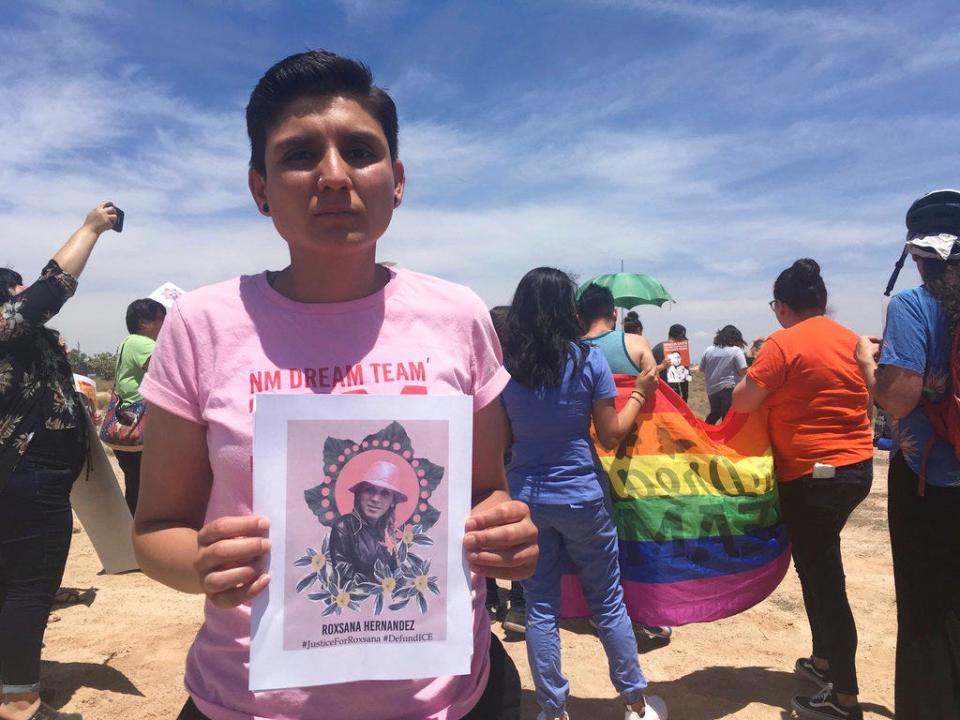Dozens of transgender detainees transferred from criticized New Mexico ICE facility
DENVER — Dozens of transgender migrant detainees have been moved from a long-criticized detention facility in New Mexico to other holding sites across the country, including a newly built unit in suburban Denver.
ICE officials wouldn't say if they had completely shut down what had been the sole housing unit dedicated to transgender women migrants at the Cibola Correctional Center in rural New Mexico. But the move of the 27 inmates last week came just days after members of Congress demanded that ICE either improve conditions for transgender detainees or simply let them go.
In a statement, ICE officials said Thursday they're working with the Cibola facility's owner, CoreCivic, to improve conditions at the detention center, which can house more than 1,000 inmates and detainees. Many ICE facilities are owned and operated by private contractors.
"ICE recognizes the unique, long-term health care management needs of detainees who identify as transgender and wants to ensure transgender detainees have access to every resource available at ICE’s disposal," an ICE spokesperson said in a statement.
ICE on Friday confirmed that all trans detainees have been removed from Cibola, and CoreCivic officials said they are in the process of hiring in-house medical staff to replace a contracted service.
“CoreCivic is committed to providing high-quality healthcare to those entrusted to our care,” company spokesman Amanda Gilcrist said in a statement. “Detainees with unique medical needs were transferred from Cibola County while the facility continues to work through this transition of providers.”
A USA TODAY Network investigation published in December revealed that some transgender inmates at Cibola felt mistreated by staff at the facility, which also serves as the county jail. Several transgender inmates held at Cibola said they had been sexually assaulted or subjected to sexual harassment.
Allegra Love, 38, an attorney and executive director of the Santa Fe Dreamers Project, has visited the Cibola facility in Milan, New Mexico, dozens of times over the past two years. Problems there mirror complaints elsewhere, she said: poor medical staffing, under-paid guards and unexpected closures and lockdowns that make it hard to effectively represent her clients. The Dreamers Project provides free legal services to immigrants, who aren’t always automatically entitled to an attorney the way criminal defendants are.

Autopsy: Bruises on transgender migrant who died in ICE custody caused by CPR, not abuse
Love said in a November interview that the medical care in particular in Ciboloa was lacking: "I've had clients with cancer, with heart conditions, and they're told to drink water, that the desert is very dry and they just need water. The medical neglect is rampant."
A federal investigation into the 2018 death of transgender detainee Roxsana Hernandez Rodriguez revealed that Cibola County, where the detention center is housed, had only one ambulance to cover its 4,500-square mile area. The Jan. 14 letter to ICE from 45 members of Congress highlighted Rodriguez's death, along with the 2019 death of another recently-transferred transgender detainee.
"Each day that ICE continues to detain transgender people is a day that the health and well-being of those individuals is at risk," the Democratic members of Congress wrote. "We ask that you honor the long-standing reputation of the United States as a refuge for individuals who face persecution and adhere to the Congressional directives regarding the treatment of transgender people...”
In an interview with USA TODAY late last year, Jenny Garcia, 23, a transgender woman who fled her home in Mexico, said guards made her strip and bathe with men at Cibola, even though they knew she identified as transgender. She said her two months in Cibola was an isolating and dehumanizing experience that included the extensive use of solitary confinement is what was supposed to be a holding center, not a jail. She said she couldn’t contact her family in Mexico and wasn’t given opportunities to contact anyone to advocate on her behalf.
'These people are profitable': Under Trump, private prisons are cashing in on ICE detainees
"They didn't treat us like people. They treated us like animals," said Garcia, who has been released and is living with a relative in California while her case is reviewed. "I was fleeing my country and I was told the asylum process was one where would they would believe me. Instead, they called me names. There were points where I couldn't stand it anymore. I felt like I was slowly dying in the detention center."
In an April 2019 inspection, a federal auditor said Cibola met standards for the Prison Rape Elimination Act, a federal law governing how detention centers and prisons must operate in order to minimize sexual assault. Among the criteria is keeping detainees of different sexes segregated, and ensuring privacy from the opposite sex during showers. The auditor said transgender detainees had their own law library, beauty salon, medical exam room and an open recreation yard separate from the rest of the population, but didn't actually interview any of those detainees.
An inspection Monday of the Aurora ICE facility in suburban Denver by Democratic U.S. Rep. Jason Crow's staff found the site was housing 20 transgender detainees in the newly opened unit and noted that the private contractor running the site, GEO Group, was working with local LGBT health experts.
"ICE is aware of the additional mental health supports needed by transgender individuals and is reaching out to community groups to do what they can to ensure these needs are met," Crow's staff said in their report. "In addition to visit with mental health professionals, they are currently offering services such as twice-weekly ESL lessons and will have the hairstyling services offered in the women’s areas extended to the transgender dorms as well."
Contributing: Kristin Lam, USA TODAY
This article originally appeared on USA TODAY: Transgender migrant detainees moved from ICE facility called unsafe

